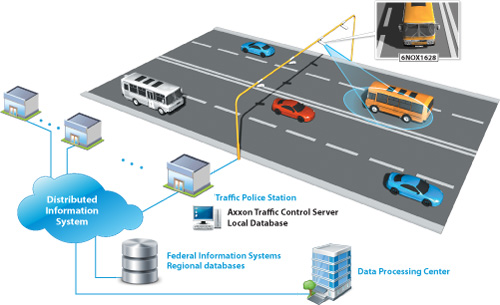License plate recognition
Auto PSIM provides the capability to recognize vehicle license plates from live camera feeds. A license plate recognition system can comprise an unlimited number of video cameras, data storage and processing servers, and monitoring workstations.
Auto PSIM saves the recognized license plate number, an image of the vehicle, a still frame containing the license plate, date/time stamp, location address, etc., to a dedicated SQL database. The system thus registers all vehicles passing through monitored areas, and lets you add textual comments for each database entry.
You can perform database search by various criteria, such as speed range, timeframe of vehicle capture, etc. Reports can be displayed on screen, saved as standard file formats or printed out.

Monitoring vehicle flow. Search capabilities.
1. Run a recognized license plate number through local, regional, and federal databases
For tracking and searching purposes, Auto PSIM lets you run a recognized license plate number through federal and regional wanted vehicle databases, as well as through your own local databases. Axxon Traffic Control is able to query a database to obtain additional information such as vehicle make, color, VIN, and individual details of the vehicle. All of this information can be displayed on the operator's screen (see paragraph 4. "Notification").
2. Search for a license plate number in all local databases of Auto PSIM
Auto PSIM lets you run a search for specific license plates in all local databases of traffic police stations, as long as those stations are connected to a unified Axxon Traffic Control system. This gives you the capability to obtain real-time information about where and when a certain vehicle appeared and in which direction it was heading. You can also compare the recent image of the vehicle with the database photo.
Example. You receive information that a vehicle with a known or partially known license plate number was involved in a 'hit and run' accident. You can use any Auto PSIM workstation at any traffic police station to enter the whole or partial license plate number of the vehicle and perform a search for it in all local license plate recognition databases at all traffic police stations operating within a unified Auto PSIM system. If the particular vehicle has passed through any monitored area, the event will immediately be reported to the workstation from which the search was initiated. You can also view the recently captured image of the vehicle to compare it with available data.
3. Real-time tracking database
Auto PSIM lets you enter a license plate number or other data on a sought vehicle into your own database on the fly. Then all license plates recognized in the monitored areas can be compared with your sought license plate number (see paragraph 1), and a successful match will result in sending a notification message (see paragraph 4). This function dramatically increases operational flexibility allowing to start a vehicle tracking even before it is entered into a regional or federal wanted vehicle database via the standard procedure.
4. Notification
If a recognized license plate number obtains a match with an external (federal or regional) or internal (real-time tracking) database, an audible notification is initiated, and an alarm message appears on screen displaying the vehicle license plate number and relevant information from the database such as the vehicle make, color, VIN, and individual details of the vehicle. An alarm message can also be configured to display whenever a traffic violation occurs, such as speeding or running a red light.
5. Operator performance monitoring
The alarm notification window is provided with a confirmation button that can be used to monitor operators' performance. In order to confirm that an alarm has been handled, the operator is required to click the alarm confirmation button within a set timeframe after the alarm is initiated. As a result, operators’ work performance can be evaluated by checking how many alarms they confirm, how long it takes them to confirm, and how many alarms they miss.